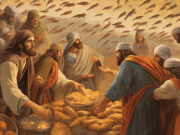
Questions. 1-57. LEADERS THAT CONQUER
Chapter 1
1.
Potential means unexposed ability, reserved power, undiscovered strength, undiscovered abilities, unused success, dormant gifts, hidden talents and living power. Potential is what we are able to do but have yet to accomplish; it’s the place we can reach, but to which we have yet to arrive. It’s who we can become but have yet to be. It’s the ability to imagine that which we have yet to imagine. It is being able to go far, though we have not arrived at that point yet. It is that which we can accomplish but have yet to do something about.
Potential is the sum of everything that we are, which has yet to be revealed or manifested.
- The principle of “potential”.
We read Matthew 13:31-32.
There is a potential tree in every seed. For example, I have a plum seed, but in reality, what I am holding in my hand is a potential tree within a seed. God created all things (animals, plants, flowers, birds and more) to live and reproduce according to the principle of the seed.
“And the earth brought forth grass, the herb that yields seed according to its kind, and the tree that yields fruit, whose seed is in itself according to its kind. And God saw that it was good” (Gen. 1:12).
Every living thing created by God, including man, was blessed with potential.
God deposited in us the ability to be much more than we are at this moment. Just like the mustard seed, we possess hidden resources and abilities yet to be exploited.
This is the principle of “potential”.
When an individual desires to develop the potential within them, God will use a friend, mentor, father, or someone else who can encourage and believe in them, thus guiding them to their destiny,
Read 12:24-25, “Very truly I tell you, unless a kernel of wheat falls to the ground and dies, it remains only a single seed. But if it dies, it produces many seeds. Anyone who loves their life will lose it, while anyone who hates their life in this world will keep it for eternal life.”
It is necessary for us to eliminate who we are and die like the seed, in order to develop the potential within us. Otherwise, the fruit can never come forth. We must crucify our flesh at the cross, daily, to do the will of God. Remember, this principle always works, and the process the seed must take: birth, death and growth, cannot be avoided.
4.The source of Our Potential.
God is the source of our potential. Read John 15;5, “I am the vine, ye are the branches: He that abideth in me, and I in him, the same bringeth forth much fruit: for without me ye can do nothing.”
This truth is extraordinarily special because the potenti us comes from our Creator! Let us keep in mind that Bible refers to Him as the “Omnipotent”. “Omni” means full of “potent” means power in reserve, from which the word comes from.
Hence, it is correct to say that God is always full of power and that He is able to do more than what He has already done. In other words, God is full of potential and power in reserve. Potential is not in man, but in God, and it is He who gives it.
We can not develop our potential if we are not connected to the source, or our Creator, God. He is the vine, we are branches.
The ability to fulfill our purpose is inside of us because we are created by God.
5. Developing Potential.
We should have a mentor. The mentor assumes the respon-sibility to develop our potential, purpose or calling. The key word is “development”. We need men or women to be our mentors and to help us develop our potential. This is the way we’ll reach our destiny. “And He Himself gave some to be apostles, some prophets, some evangelists, and some pastors and teachers, for the equipping of the saints for the work of ministry, for the edifying of the Body of Christ.” -EPHESIANS 4. 1 1,1 2
We must be in the right place. When God created man, He put him in the Garden of Eden, the ideal place for man to grow and develop his potential. Likewise, to develop our potential, it is necessary for us to be in the right place where we can be encouraged to accomplish higher levels of maturity, where we are affirmed and our potential recognized, where the leader identifies our calling and opens doors to help develop it.
We must cultivate our potential. It is essential for us to make the decision to grow. Our potential will never surface until we make the commitment in our minds, plans and dreams, and then, place them in action. We should work or cultivate our potential by seeking the right people, with positive attitudes, that can encourage us and help us succeed. We need to take care of and use the gifts God has given us. We must seek an apostle, or a pastor, an evangelist, a teacher, or prophet with the heart of a father that can help us identify our calling or potential.
- Perfection. The word “perfection” in the Greek language is “katartis-mos”, meaning to prepare, train or equip. God instituted the five ministries to develop our potential. We all need apostles, prophets, teachers, evangelists or pastors that can teach us, equip us and help us develop the purpose for which we were created.
7. Born Again.
The expression “born again” comes from the Greek word “gennao,, meaning “born from the genes of”. It is in the genes that all inherited characteristics are found. Therefore, from God’s DNA come all the characteristics that are in our genes, as well as the potential to become all that God wants us to be. The purpose of anything can’t be known if we search for it in places other than in the designer or the Creator. Likewise, the ability of the product to fulfill its purpose is designed within the product. We can’t develop our potential if we are not connected to God – our Creator.
Chapter 2
- A leader is one who can: encourages, inspires, motivates, exerts influence, guides, mobilizes, activates, persuades, disciplines and corrects another.
- Leaders can be classified in two categories according to their potential: ■ The natural born leader: Some people are born leaders. They wake up in the morning with a hundred things to do, but regardless of how busy they are, everything gets accomplished. When they speak, people follow. An example of leadership are talented boys. When they speak, other children follow. They have the natural gift of leadership. ■ Leader that is created or trained: Not all leaders are born with the ability to lead; some emerge with potential for leader-ship thanks to mentors willing to disciple them and help them grow. When this happens, their growth is quick, not only in ability, but also in gifts. Good mentors can perceive a person’s potential, even when they cannot see it themselves.
The characteristics of a leader:
- he is an original
- he focus on the global picture
- he focus on people
- he is always willing to grow
- he works to make things happen
- he has a positive, stable attitude
- he knows to how help people reach their potential
- The two greatest responsibilities of a leader.
– To be a role model
- To be a mentor or a father
- A role model resembles the life of Jesus and His character. Jesus is love, peace, joy, patience, humbleness and has a positive attitude.
- The mentor or father has several functions or role: – One who guides – Encourager
– Source
– Teacher
– Nurturer
– Protector
– Provider
- Profile of a leader:
– They are visionary
– They are self-disciplined
– They make things happen
- They have integrity
- They are influential over other people
- They are peacemakers
- They are faithful and loyal
- They are teachable
- They exhibit self-control
- They know their destiny in Christ
Chapter 3
15.
Idea: It is a conceived, captured or retained thought. It is the mental representation of something or an act of understanding.
- Word: It is a revealed and exposed thought. The word expresses the idea.
- 16.
IDEOLOGY:
It is an established idea or set of ideas characterizing a person, group, period of time, or a cultural, religious or political movement. For example; three Greek ideologists established democracy. This resulted in many people around the world embracing those established ideas as their own, thus living and leading their lives accordingly. God speaks to us through ideas and thoughts, though oftentimes, we want Him to speak to us through His audible voice. When an ideology is established, then it becomes a philosophy.
17.
Philosophy:
This word can be divided into two parts:
– Philo: love
- Sophy: understanding, knowing
- Philosophy is the love of knowledge. It is to love what we know and to dwell in our thoughts. In modern terms, philosophy means to be in love with our way of thinking or mentality. A philosopher thinks and speaks his own thoughts. We have our own philosophy or way of seeing things that, simply stated, is not a philosophy that comes from God, but from the world. The source of our idea: should be God; otherwise, our philosophy is wrong. “For as he thinks in his heart, so is he.” (Pro. 23.7) The way a man thinks in his heart, determines what he is.”
18.
What is a stronghold? Mention five of them:
Stronghold: It is an established idea in the mind that predisposes the person to certain ways of reacting. It is a mindset, impregnated with hopelessness, by which the individual accepts as a fact that a particular situation can not be changed. A stronghold is anything that hinder an individual from doing what God says they can do or becoming who God says they are. Remember the word, “For as he thinks in his heart, so is he.” The result becoming of certain philosophies is the development of strongholds in our minds, which create mentalities that become the basis for every action we take.
Five of them:
■ Strongholds that set limitations. These are spoken words linked to the mentality of “I can’t:’ “I’m worthless:’ and “I’m unworthy:
■ Deceptive strongholds. When an individual embraces a lie and rejects the truth.
■ Philosophical strongholds. These are false doctrines the enemy uses to deceive people. “Whose minds the god of this age has blinded, who do not believe, lest the light of the gospel of the glory of Christ, who is the image of God, should shine on them” (2 Cor. 4:4).
■ Strongholds of pride. These strongholds are always looking for ways to exalt the ego, making people think they are better than others.
■ Mental strongholds. These thoughts are based on teachings and personal experiences that are closed to revelation or to changes God wants to do.
19.





























